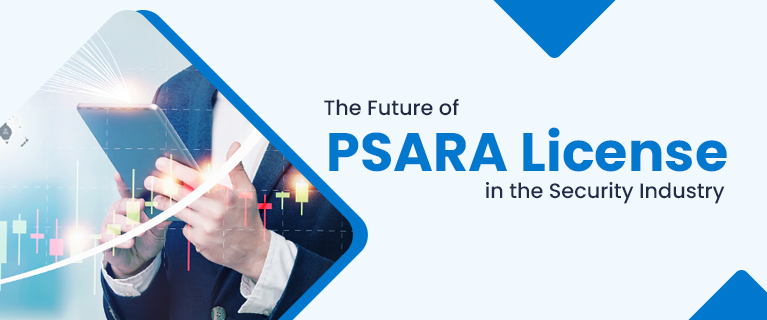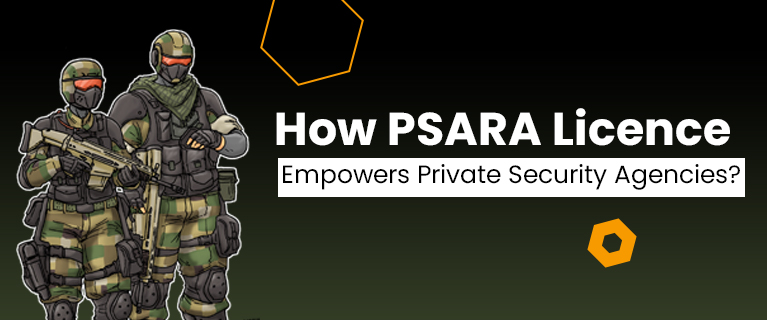PSARA License in India
Private security is a critical aspect of ensuring safety and protection in various sectors, including commercial establishments, residential complexes, and events. The PSARA act states that it is mandatory for the private security agencies to obtain a PSARA License to operate legally. In this blog, we will delve into the documentation, fees, and process involved in obtaining a PSARA License in India.
1. Documentation Requirements:
To initiate the PSARA License application process, private security agencies must gather the following essential documents:
These documents outline the agency's objectives, structure, and operational guidelines. They provide detailed information about the agency's legal status and ownership structure.
The Certificate of Incorporation is obtained from the Registrar of Companies (RoC) and serves as proof of the agency's legal establishment as a private limited company or any other applicable entity type.
The agency must provide copies of the Permanent Account Number (PAN) card of the entity and valid address proof of the registered office, such as utility bills, lease agreement, or property documents.
Read also this -: The Future of PSARA License in the Security IndustryFinancial documents, including audited financial statements, bank statements, and income tax returns, should be submitted to demonstrate the agency's financial stability and capability to operate as a private security agency.
Details of the directors, including their identity proof (such as Aadhaar card or passport), address proof, and photographs, are required. The directors' educational qualifications and experience in the security industry may also need to be provided.
The agency must provide details of the security personnel it employs, including their identity proof, address proof, educational qualifications, training certificates, and background verification reports.
Information regarding the training programs conducted by the agency, including the curriculum, duration, training materials, and certifications, should be documented.
The agency must furnish information about the infrastructure and equipment it possesses, such as control rooms, communication systems, surveillance equipment, and other essential facilities.
2. Fee Structure:
The fee structure for obtaining a PSARA License varies depending on the state or union territory where the agency intends to operate. The fees are typically divided into different components, including application fees, registration fees, and security deposit. The exact fee structure can be obtained from the respective controlling authority or regulatory body responsible for issuing the PSARA License in the specific jurisdiction.
3. Application Process:
The process for obtaining a PSARA License involves the following steps:Step 1: Verification of Eligibility:
The agency must ensure that it meets the eligibility criteria specified by the PSARA Act and the respective state government's regulations. Eligibility criteria typically include factors such as the minimum number of personnel, compliance with labour laws, and financial stability.
Step 2: Preparation of Documents:
The agency must gather all the necessary documents as per the documentation requirements discussed earlier. It is essential to ensure that all documents are accurate, complete, and up-to-date.
Step 3: Application Submission:
The completed application, along with the required documents, should be submitted to the designated controlling authority or regulatory body responsible for issuing the PSARA License. The application form can be obtained from the respective authority or downloaded from their official website.
Step 4: Verification and Inspection:
Upon receiving the application, the controlling authority conducts a thorough verification of the submitted documents. They may also conduct an on-site inspection of the agency's infrastructure, equipment, and training facilities to assess compliance with the prescribed guidelines.
Step 5: Fee Payment:
The agency must pay the applicable fees as per the fee structure specified by the controlling authority. The fees can be paid through online modes or in the form of demand drafts, as per the authority's guidelines.
Step 6: Licence Issuance:
If the agency successfully fulfils all the requirements and the verification and inspection processes are satisfactory, the controlling authority issues the PSARA License. The licence is typically valid for a specified period and must be renewed periodically as per the regulations of the respective state government.
It is important to note that the exact process and requirements may vary slightly depending on the state or union territory where the PSARA License is being obtained. It is advisable to consult the relevant controlling authority or regulatory body and carefully follow their guidelines and instructions throughout the application process.
Read also this -: How to Apply Online for a PSARA LicenseConclusion
obtaining a PSARA License in India is a structured and regulated process aimed at ensuring the professionalism, compliance, and integrity of private security agencies. By fulfilling the documentation requirements, paying the applicable fees, and adhering to the prescribed process, private security agencies can acquire a PSARA License and operate legally in their chosen jurisdiction. The licence not only provides a legal framework for private security agencies but also instils trust and confidence among clients, stakeholders, and the general public. Compliance with the PSARA Act and the licensing process contributes to a safer and more secure environment, fostering professionalism and accountability in the private security industry.




Comments
Post a Comment